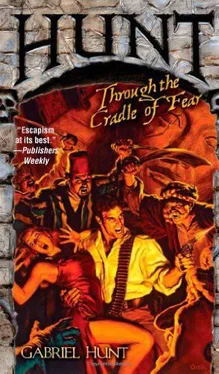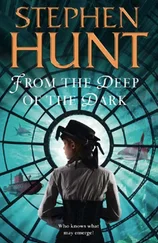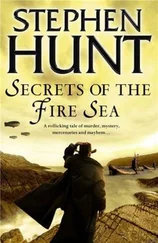Gabriel Hunt - Hunt Through the Cradle of Fear
Здесь есть возможность читать онлайн «Gabriel Hunt - Hunt Through the Cradle of Fear» весь текст электронной книги совершенно бесплатно (целиком полную версию без сокращений). В некоторых случаях можно слушать аудио, скачать через торрент в формате fb2 и присутствует краткое содержание. Год выпуска: 2011, Издательство: Dorchester Publishing Co., Inc., Жанр: Старинная литература, на английском языке. Описание произведения, (предисловие) а так же отзывы посетителей доступны на портале библиотеки ЛибКат.
- Название:Hunt Through the Cradle of Fear
- Автор:
- Издательство:Dorchester Publishing Co., Inc.
- Жанр:
- Год:2011
- ISBN:нет данных
- Рейтинг книги:3 / 5. Голосов: 1
-
Избранное:Добавить в избранное
- Отзывы:
-
Ваша оценка:
- 60
- 1
- 2
- 3
- 4
- 5
Hunt Through the Cradle of Fear: краткое содержание, описание и аннотация
Предлагаем к чтению аннотацию, описание, краткое содержание или предисловие (зависит от того, что написал сам автор книги «Hunt Through the Cradle of Fear»). Если вы не нашли необходимую информацию о книге — напишите в комментариях, мы постараемся отыскать её.
Hunt Through the Cradle of Fear — читать онлайн бесплатно полную книгу (весь текст) целиком
Ниже представлен текст книги, разбитый по страницам. Система сохранения места последней прочитанной страницы, позволяет с удобством читать онлайн бесплатно книгу «Hunt Through the Cradle of Fear», без необходимости каждый раз заново искать на чём Вы остановились. Поставьте закладку, и сможете в любой момент перейти на страницу, на которой закончили чтение.
Интервал:
Закладка:
There was a statue in the passageway, just a few feet away. It was exquisitely detailed, as naturalistic as the ones Gabriel had found in the chambers in Egypt and Greece. But this one didn’t depict a sphinx.
It was Karoly.
He was frozen in an attitude of terror, one hand flung up before his face, the other—the one with the broken wrist—dangling crookedly by his side. But his body, his clothing…
Was stone.
Gabriel ran his fingers over the surface. His heart began trip-hammering again, worse even than when he’d been dangling at the edge of the pit. “What happened? Did he touch something? Did he…did he step on something? Inhale something?”
Sheba shook her head vigorously. “I was running away. I heard him coming after me, and then a sound…”
“What sound?”
She didn’t answer. But, then, she didn’t have to. Because they both heard the sound then. It was a low, rumbling growl, accompanied by the slow padding of clawed footsteps against stone.
“Get back,” Gabriel said, taking the flashlight from her.
The footsteps came closer, then stopped, just out of sight.
“And you,” came a voice from the darkness. “Have you come to disturb my peace as well?”
It spoke in Greek. Not the modern Greek the men of Avgonyma had used—the voice had the same ring of antiquity about it that Tigranes had had when declaiming his verses of heroism and disaster.
“No,” Gabriel responded in the same tongue, “we do not wish to disturb anything.”
A shape appeared then at the edge of the pool of light the flashlight cast. The figure was low and muscular—an animal’s body. And when it moved it was with the languorous rippling grace of a jungle cat, a jaguar or a lion. But its torso rose higher than any cat’s, and the silhouette of its head was…
Gabriel gripped the flashlight tighter.
The silhouette of its head was a man’s.
“You speak the language of Olympos like a foreigner,” the sphinx said, stepping forward into the light. “Like an invader. ”
It reared up, its paws extended fully. It was almost Gabriel’s height this way—and clearly many times his weight. The hair cascading over its shoulders was as gray as the fur upon its chest, and its face was lined, drawn. But its eyes were fierce and clear, their irises a piercing sapphire blue. And stretching along the creature’s back Gabriel saw a folded pair of wings.
He blinked to clear his vision, thought back to the brief moments of vertigo he’d felt climbing the mountain, the stings he’d suffered from the wasps, the hours since he’d eaten. Could he be hallucinating? But if he was, Sheba seemed to be as well, judging by the strength with which her fingers were digging into his arm from behind.
Gabriel made himself step forward. “It’s true,” he said, “that we are not from Greece. But we are no invaders.”
“You come here,” the sphinx said, its voice rising as it spoke, “you discharge your weapons, you shatter a peace of centuries, and yet you say you are not invaders! How dare you?”
“We came to stop this man,” Gabriel said, gesturing behind him, toward Karoly’s remains, “and another you’ll find dead on the mountaintop. They were the invaders—they were searching for your treasure, to use it for terrible ends.”
“My treasure? I have no treasure.” The sphinx shook its head roughly, and its hair flew about.
“Maybe you don’t think of it as treasure,” Gabriel said. “But whatever you used to…to do this.” And he gestured backwards again.
“All men have stone within them,” the sphinx said brusquely. “All living creatures do. When I wish, I bring it out. I don’t use anything to do so.”
“You do it just by…by looking at them?” Gabriel said.
“What does looking have to do with it? I could make a statue of you just as well with my eyes closed,” the sphinx said. “Both of you. Any of you! I could salt the earth with statues! I could end all of your kind at once, however many millions you now pestilentially represent. Or is it billions now, I wonder? You multiply so…”
“That can’t be,” Gabriel said. “It can’t. You can’t turn billions of people to stone.” But hearing himself say this he wondered—a day ago he’d have said it was impossible to turn even one person to stone. Was a billion less plausible?
“Don’t test me, human,” the sphinx said. “You will rue it. Perhaps I will leave you alive, the last of your kind as I am of mine, to lament to the end of your paltry days that you doubted me.”
“I don’t,” Gabriel said quickly. “I don’t doubt—”
“You lie!” the sphinx roared. It began pacing, walking in a tight circle around them. It had a musky, unwashed smell, a smell of exertion and lassitude. For all its explosive anger, Gabriel got a sense of fatigue from the creature, of extreme age and isolation.
“You lie,” it repeated. “And you must pay for it.” It leaned in close to Gabriel, its breath hot on his cheeks. “But I shall be fair. My kind always has been—we have always dealt by the rules we’re bound by, though we suffer grievously for it.
“I will pose for you a question, a simple question. It calls for a simple answer, and if you give it I will let you live—all of you. But if you do not answer, if you cannot answer, if you choose not to answer, if you fail to answer, then, human, I will let only you live—you alone of all humanity, and a world of stone to keep you company in your grief.”
“Gabriel, you can’t—” Sheba said.
“Ah, the female speaks as well,” the sphinx said. “It is unfortunate she counsels you so poorly.” It turned a baleful glare upon her. “Not only can he, he must. It is my will.”
“What’s the question?” Gabriel said, thinking of all the legends he’d read, all the stories about the Theban sphinx. There was the famous riddle: What walks on four legs in the morning, two in the afternoon, and three in the evening, and is the weaker the more legs it has? The answer being man: the crawling infant, the erect adult, and the infirm elder. And there was its sometime corollary: What two sisters are they, the first giving birth to the second, and then the second once more to the first? To which the answer was night and day. Either of those he could answer, and he thought he could manage others of their ilk.
“The question is this,” the sphinx said. “What is my name?”
“Your name?” Gabriel said.
“My name!” the sphinx screamed, its voice echoing from the walls. “You will know my name. I will teach you my name. But—” It put a paw against Gabriel’s chest. “—only when you fail to guess my name.”
Rumpelstiltskin, Gabriel wanted to say. Your name is Rumpelstiltskin, and you can spin straw into gold…
Your name. Your name. How in God’s name, you’ll pardon the expression, am I supposed to pull the right answer out of the thousands, the hundreds of thousands, the almost infinite possibilities? This is no riddle! He wanted to shout it: This is a fix-up, a fraud, a pretext for slaughter!
But no—it wouldn’t be. If the beast had wanted merely to kill them it could have. If it really had the power it claimed, it could have slaughtered all humanity at any time. It needed no pretext. If instead of killing it had asked this question, there had to be a way to answer it—a clue, a hint…something. Gabriel thought back to his first glimpse of the Sphinx in Egypt, the great and terrible Abul-Hôl, looming in the night. He thought back to the inscriptions, to their talk of a divine or holy treasure, and to the statues into whose flanks they were carved—which statues, with their impossible degree of sculptural perfection, must, he now knew, have been actual, living sphinxes once. And he thought of the story Tigranes had recounted, of the Theban sphinx’s journeys and her tribulations.
Читать дальшеИнтервал:
Закладка:
Похожие книги на «Hunt Through the Cradle of Fear»
Представляем Вашему вниманию похожие книги на «Hunt Through the Cradle of Fear» списком для выбора. Мы отобрали схожую по названию и смыслу литературу в надежде предоставить читателям больше вариантов отыскать новые, интересные, ещё непрочитанные произведения.
Обсуждение, отзывы о книге «Hunt Through the Cradle of Fear» и просто собственные мнения читателей. Оставьте ваши комментарии, напишите, что Вы думаете о произведении, его смысле или главных героях. Укажите что конкретно понравилось, а что нет, и почему Вы так считаете.












